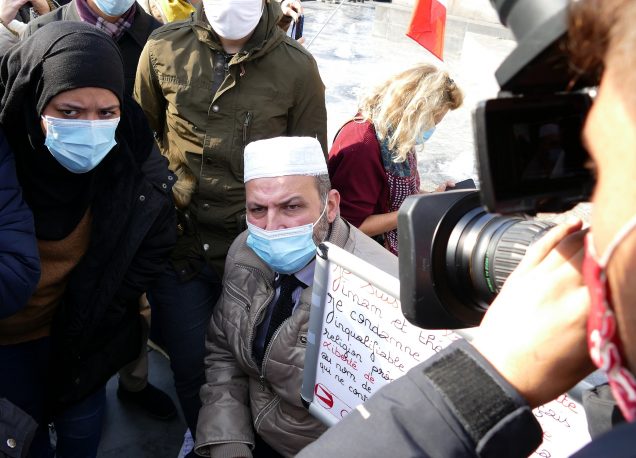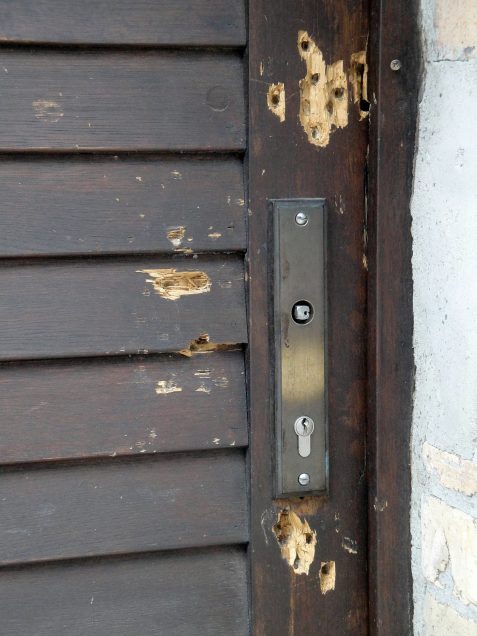Immigration, the far Right and Terrorism
Marginalized groups are particularly vulnerable to stress and mental illness, especially ethnic minorities. Such problems are most pronounced among second-generation immigrants [1]. Children from immigrant families have a higher risk of schizophrenia and stress trauma compared to the majority ethnic group [2]. According to Racism and mental, Discrimination affects early psychological development. Exposure to everyday discrimination in childhood may lead to trauma and stress in adulthood, as well as other physical problems (U. Kluge, 2020) [3].
In many sociological studies of immigrant populations, a lot of social exclusion can be found. Immigrants often have tighter social networks in their immigrant communities. Compare with mainstream society, their networks tend to be much smaller [4]. Those social exclusion and isolation increases the risk of mental illness [2]. In 2019, the EU-27 unemployment rate for people aged 20 to 64 years was 12.3 % for those born outside the EU, 7.3 % for those born in another EU Member State and 6.0 % for the native-born population [7]. There is no data on the impact of mental health problems on employment, but academic failure resulting from an unhealthy upbringing may have an impact on employability later in life.
This isolation and closure has some relevance to terrorist activities. In some cases, although there was no evidence that the perpetrators of terrorist acts had mental problems, the impact of culturally gated communities on them was visible. In addition, disgust, hatred and contempt for the mainstream society are the most common attitudes. For example, in the 7 July 2005 London bombings, 52 people were killed and more than 700 injured. The four suicide bombers, were all from immigrant families, made a video statement before carrying out the attack:
“I and thousands like me are forsaking everything for what we believe. Our drive and motivation doesn’t come from tangible commodities that this world has to offer. Our religion is Islam, obedience to the one true God and following the footsteps of the final prophet messenger. Your democratically-elected governments continuously perpetuate atrocities against my people all over the world. And your support of them makes you directly responsible, just as I am directly responsible for protecting and avenging my Muslim brothers and sisters. Until we feel security you will be our targets and until you stop the bombing, gassing, imprisonment and torture of my people we will not stop this fight. We are at war and I am a soldier. Now you too will taste the reality of this situation”[5].
Although the proportion of people with immigrant backgrounds exposed to extreme religious ideas is low, the damage of reputation of the immigrant community can be enormous. In the last two decades, a number of terrorist attacks based on extremist religious ideology have occurred. For example, on August 17, 2017, the extremist group Islamic State claimed responsibility for the attack that a van plowed into pedestrians in the center of Barcelona, killing at least 13 people and injuring more than 50; November 2015 Paris attacks, “Jihadists” killed 130 people, another 416 people were injured. Records show that the perpetrators of these terrorist attacks came from immigrant families.
Immigrant communities, surrounded by their kinsfolk, retain a strong sense of identity with their homeland. For terrorists, the mass base is better in immigrant communities, where discontent with the state is high and concentrated in communities where the administrative force is weak (the police are afraid to go or do not want to manage).The culture of these communities is predominantly anti-government, anti-police, proud to throw rocks at police cars, ashamed to report informants, facilitating terrorist movement, propaganda, logistics, and development referrals. The Algerian community is one of the most common immigrant communities in France. Algerian War of Independence (1954-1962), resulting in a large number of Algerian deaths. The French eventually abandoned Algeria, leaving the locals with bad memories of mass killings and torture. But after Algeria gained independence in 1962, this French-hating country became France’s biggest source of immigrants. Although the policy of France is against various ethnic groups living together to form communities, it has accumulated difficulties over the decades and formed a large number of so-called sensitive areas with high incidence of public security incidents.
 Algerians are the largest immigrant community in France, accounting for 12.8 percent of the total number of foreigners living in the country, according to the French Institute of Statistics (INSEE) [9]
Algerians are the largest immigrant community in France, accounting for 12.8 percent of the total number of foreigners living in the country, according to the French Institute of Statistics (INSEE) [9]
The Murder of Samuel Paty has again intensified the stigmatization of immigrant communities. Paty was killed and beheaded by an Islamist terrorist. He had, in a class on freedom of expression, shown his students Charlie Hebdo’s 2012 cartoons depicting the Islamic prophet Muhammad. One of the cartoons portrayed Muhammad naked with his genitals exposed. The cartoons having been protested by many Muslims in the past, Paty preemptively permitted his students to avert their eyes or leave the room while they were displayed. The perpetrator, Abdoullak, killed and beheaded Paty with a cleaver, and was shot and killed by the police minutes later. Ten people have been charged with assisting the killer, including an imam, a parent of a student, and two students at Paty’s school. They all have the same religious background and come from immigrant communities [6]. The attack on Patti was part of a public debate about how to integrate or integrate Islam into France’s secular society. A public opinion survey, conducted by the Institute for the Republic of France (Ifop), found that 87 percent of respondents believed that France’s secular society was under threat, while 79 per cent believed that Islam had declared war on France and the French republic. The survey found that 89 percent of those surveyed thought the threat from terrorism was high.
 French Muslims in attendance at tribute for Paty [6]
French Muslims in attendance at tribute for Paty [6]
Multiculturalism means that different ethnic groups can cooperate and talk with each other without sacrificing their special status. In terms of policy, society guarantees the interests of different ethnic groups with the authority of the state. After the second world war, large numbers of people from former colonies, most of them Muslim, migrated to Europe to make up for labor shortages. With the increase of immigration, immigrant communities dominated by Muslim communities appeared in Europe, forming religious beliefs and living habits different from the mainstream society. Therefore, most European countries have adopted multicultural policies, such as the United Kingdom, the Netherlands, Belgium and Sweden, which have adopted multi-lingual official languages and classified teaching policies. However, the rise of Muslim immigration has made social tensions more acute. In particular, In the last two decades, Islamist extremism has created a backlash against Muslim immigration in Europe. Since 2010, major European leaders have begun to declare multiculturalism a failure. The refugee crisis that began in 2015, with the increase of terrorist attacks, declared the complete failure of multiculturalism. As a result, Europe began to “turn to the right”, which was marked by an increase in violent crimes and terrorist attacks against Muslims and immigrant groups. Through the analysis of the terrorist attackers and their targets, it can be seen that the Islamic extremist forces and the far-right forces are the main forces of the current terrorist attacks in Europe, and the two sides have staged a drama of “clash of civilizations” in Europe.
Especially against the backdrop of the economic crisis, anti-immigration trends are rising in Europe, and the theory of failure multiculturalism is constantly being mentioned. In the eyes of those who hold this view, American multiculturalism is the “melting pot” and European multiculturalism the “fence”. By respecting and protecting the cultures of immigrants, Europeans bought their loyalty to our home countries. It is like encouraging immigrants to build fences and live on their own. When crisis strikes, however, some angry glances are directed at the world behind the fence.
The attacker of Hanau shootings is a typical example. 11 people were killed, 5 others were wounded in the shooting. All but the killer were of immigrant background, five of whom were Turkish. The shooting took place at two shisha bars frequented by Kurds in the city of Hanau. The shooter Tobias Rathjen was found dead in his home, killed his mother too. The perpetrator had suffered from schizophrenia and paranoia. The perpetrators are also socially isolated and addicted to online subcultures, particularly far-right and lone-wolf terrorism. The cause of the perpetrator’s mental illness is unknown, he was not a marginalized member of society and held an MBA degree. What is clear is that mental illness and far-right ideology combined to contribute to the terrorist attack.
Another example is Halle synagogue shooting. The attack began at midnight on Yom Kippur, the Jewish day of atonement, at the synagogue in Halle. The attacker, Stephan Balliet, tried to broadcast his attack live on the Internet, but failed to blast the gates because the synagogue’s security system had recently been upgraded. He later shot and killed a female bystander. After killing the woman, Balliet drove to a nearby kebab restaurant. He opened fire from the window, wounding a customer in the store. The perpetrator, Balliet, was a neo-Nazi and had no record of mental illness. In her live broadcast, Balliet denied the Holocaust and claimed that feminism led to fewer births, leading to mass immigration; He blamed the Jews for these problems. Police believe the perpetrators acted as imitations of a previous Christchurch Mosque shootings.
 Bullet holes in the entrance door right in front of the synagogue [8]
Bullet holes in the entrance door right in front of the synagogue [8]
Overall, terrorism and far-right extremism are the two major security problems facing Europe. Although this is due to a combination of social factors, early intervention and psychological support can play a positive role in preventing terrorism and extreme right-wing extremism. The government could improve oversight of the far right and, if necessary, impose mental health interventions for extreme involvers. For ethnic minorities and immigrants, there is a risk of discrimination in the use of health services, which causes them to deliberately not seek help from medical institutions when they face non-emergency injuries. Equality among communities is difficult to achieve to a certain extent, but community-based medical and health institutions can be a solution.
References
[1] Sarah Stark Casagrande, 2007, Perceived Discrimination and Adherence to Medical Care in a Racially Integrated Community
[2] Elizabeth Cantor-Graae, 2005, Schizophrenia and migration: a meta-analysis and review
[3] U. Kluge, 2020, Trauma-Zeitschrift für Psychotraumatologie und ihre Anwendung: Rassismus und psychische Gesundheit
[4] RD Putnam, E Pluribus Unum, 2007, Diversity and Community in the Twenty‐first Century, The 2006 Johan Skytte Prize Lecture
[5] BBC, eLondon bomber: Text in full, 1 September 2005. Retrieved 14 October 2010
[6] Murder of Samuel Paty, https://en.wikipedia.org/wiki/Murder_of_Samuel_Paty#Perpetrator
[7] Eurostat, 2020, Migrant integration statistics – labour market indicators
[8] Halle synagogue shooting, https://en.wikipedia.org/wiki/Halle_synagogue_shooting
[9] Arezki Benali, 2018, Les algériens sont la première communauté immigrée en Franc